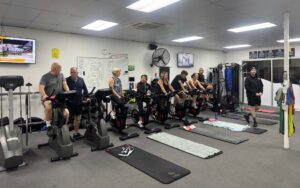Exercise physiology is an expanding field dedicated to understanding how physical activity influences the human body. Curious about what an exercise physiologist does? Explore their vital role in health and fitness, helping individuals improve performance and recovery. Professionals in this area, known as exercise physiologists, study how different types of exercise impact health, fitness, and recovery, making them essential for anyone looking to enhance their physical wellbeing. They assess each individual’s physical needs, taking into account age, medical history, and personal fitness goals to create tailored exercise programs. Unlike personal trainers, exercise physiologists have in-depth training in biology, anatomy, and physiology, enabling them to guide clients through safe, science-based workouts. Whether helping an athlete recover from an injury or aiding a patient in managing chronic disease, exercise physiologists provide vital support, improving not only physical performance but overall health outcomes.
Benefits of Working with an Exercise Physiologist
Working with an exercise physiologist offers a range of benefits that go beyond standard fitness training. These professionals are trained to understand how the body responds to various types of physical activity, allowing them to craft exercise plans tailored to individual needs and health conditions. For people with chronic illnesses—such as diabetes, heart disease, or arthritis—exercise physiologists create safe, effective programs that can help manage symptoms and improve quality of life. They are also skilled in injury prevention and rehabilitation, guiding clients through exercises that strengthen specific muscle groups, reduce pain, and restore mobility. By focusing on scientifically-backed methods, exercise physiologists help clients achieve long-term health improvements. This approach not only boosts physical fitness but also contributes to mental well-being, as exercise is linked to reduced stress and improved mood. Working with an exercise physiologist can be transformative for those seeking sustainable health results.
What Does an Exercise Physiologist Do?
An exercise physiologist specializes in assessing, designing, and implementing personalized exercise programs to improve health outcomes. Their role often begins with an in-depth assessment of a client’s current physical condition, health history, and specific goals, such as enhancing athletic performance, managing chronic conditions, or recovering from injuries. By analyzing a person’s cardiovascular, muscular, and metabolic responses to physical activity, exercise physiologists can identify any potential risks and develop targeted strategies to boost physical fitness and wellness safely. They monitor clients’ progress closely, adjusting exercise routines as needed to maintain effectiveness and safety. Exercise physiologists are commonly found working alongside healthcare providers, supporting treatments for conditions like cardiovascular disease, obesity, and osteoporosis. Their expertise allows them to guide clients through evidence-based exercises that not only enhance physical performance but also foster better long-term health and resilience.
Key Skills Required for an Exercise Physiologist
Exercise physiologists rely on a specialized set of skills to assess, guide, and support clients effectively. A strong foundation in human anatomy and physiology is essential, as these professionals must understand how various body systems respond to physical activity, stress, and recovery. Analytical skills are equally crucial, allowing them to interpret test results, such as cardiovascular or respiratory assessments, and use these insights to tailor exercise programs safely. Communication and empathy are also key, as exercise physiologists often work with clients managing challenging health conditions. They must be able to explain complex concepts in accessible terms, motivating clients while offering reassurance. Additionally, critical thinking and adaptability enable them to adjust programs based on clients’ progress, ensuring optimal results. These skills make exercise physiologists well-equipped to design science-backed, individualized exercise plans that are both effective and safe for long-term health benefits.
Where Exercise Physiologists Work
Exercise physiologists can be found in a variety of settings, each catering to different aspects of health and fitness. Many work in healthcare facilities, such as hospitals and rehabilitation centers, where they assist patients recovering from surgeries or managing chronic illnesses like heart disease and diabetes. Here, they collaborate with doctors and physical therapists to create exercise programs that align with medical treatment plans. Others are employed in fitness centers and sports organizations, where they focus on enhancing athletic performance, injury prevention, and rehabilitation. Some exercise physiologists work in research institutions, contributing to studies on physical activity, human physiology, and disease prevention. Corporate wellness programs also employ them to develop fitness and wellness initiatives aimed at improving employee health. By working in these diverse environments, exercise physiologists play a crucial role in promoting healthier, more active lifestyles across a wide spectrum of individuals and communities.
What’s the Difference Between an Exercise Physiologist and a Personal Trainer?
While both exercise physiologists and personal trainers help clients improve their fitness, the scope and focus of their roles are distinct. Exercise physiologists are healthcare professionals with advanced training in physiology, often holding degrees that cover medical, biological, and scientific aspects of human movement. They work with clients who may have specific health challenges, like cardiovascular disease, arthritis, or metabolic disorders, tailoring exercise regimens that complement medical treatments and aid in recovery. Personal trainers, on the other hand, typically focus on general fitness goals, such as weight loss, muscle building, or endurance enhancement. While personal trainers may hold certifications and have strong fitness knowledge, they generally lack the clinical training to address complex medical needs safely. As a result, clients with health conditions benefit from working with an exercise physiologist, who has the expertise to design safe, evidence-based exercise programs that support holistic health.
Conclusion
Exercise physiologists play a critical role in bridging the gap between healthcare and fitness, offering specialized guidance that can lead to transformative health improvements. Their extensive training in human physiology and exercise science allows them to create individualized programs that cater to a wide range of needs—from enhancing athletic performance to managing chronic illnesses. By focusing on scientifically supported methods, exercise physiologists help clients achieve sustainable results, not only in physical fitness but also in overall well-being. Whether working in a hospital, a research setting, or a fitness facility, these professionals bring valuable insight and expertise to their clients’ health journeys. For anyone seeking a structured, personalized approach to exercise that aligns with their unique physical and medical needs, partnering with an exercise physiologist can be a beneficial investment in long-term health and quality of life.






